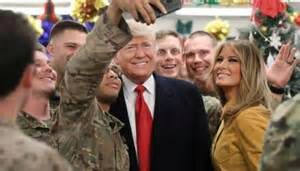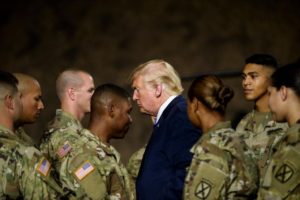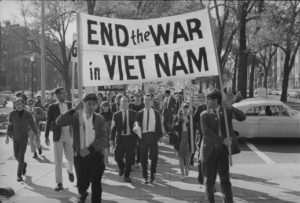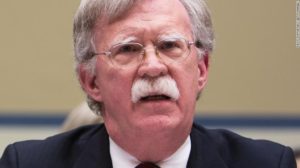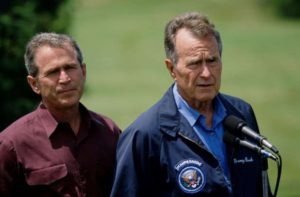
George Herbert Walker Bush’s presidency was cut short by perhaps one of the more ironic twists of political fate in recent U.S. history.
President Bush, who died Friday at age 94, was elected in 1988 and sought re-election in 1992. He was victimized by the wisdom of a decision to back away from an ill-considered promise delivered from the podium of the Republican National Convention in New Orleans.
“Read my lips,” the then-vice president intoned at the ’88 GOP convention, “no new taxes.” The crowd erupted. They cheered. They whooped and hollered.
But wait! After he took office in 1989, the economy began to slow down. It fell into a fairly deep recession. What was the president going to do about it? He retracted his “no new taxes” pledge and got Congress to do the very thing he said he wouldn’t do . . . ever!
The 1990 deficit reduction act proved to be a fiscally sound — and politically dangerous — policy decision. It created a rebellion among the Republican Party caucus in Congress. As USA Today noted in its editorial, the measure laid the groundwork for the budget surpluses that would follow.
The irony of it is that the economy began sputtering back to life in early 1992. By then the die had been cast, to Bush’s ultimate dismay. The Democrats ran a young governor, Bill Clinton, against him. Then in jumped the Dallas billionaire H. Ross Perot to muddy it up some more.
Clinton was elected in 1992. Bush blamed Perot for costing him re-election, but in truth Clinton was likely to win without a third candidate in the contest.
President Bush’s decision to renege on his tax pledge — if only modestly — proved to be his undoing. The voters rendered a harsh, and arguably unfair, decision in 1992. They said a promise made from a convention podium should be as good as gold.
It saddens me as I look back on that time.
It also saddens me that another decision, to end the Persian Gulf War without toppling Iraqi dictator Saddam Hussein, led to a horrendous decision by one of Bush 41’s successors, his own son, President George W. Bush.
Iraq invaded Kuwait in August 1990. President Bush declared the aggressive “will not stand.” He went to the United Nations, gathered up an international alliance of nations, directed the Joint Chiefs of Staff to craft a strategy to evict the Iraqis from Kuwait. Then we went to war.
It ended quickly. The Iraqis fled from the mighty onslaught led by U.S. forces. Then the commander in chief made the decision to end it. Mission accomplished. The Iraqis had been tossed out. Saddam Hussein remained in power.
But the decision to end the war, to keep faith with the U.N. resolution authorizing it resulted in total containment of Iraq and of Saddam Hussein. There appeared to be a semblance of stability settling in the region.
But then Bush left office. Bill Clinton served two terms and he left office in 2001. We got hit by the terrorists on 9/11, and President Bush 43 sent us to war against the terrorists.
Then, for reasons that still baffle many of us, President Bush decided to topple Saddam Hussein. We invaded Iraq in March 2003. We captured Saddam Hussein, put him on trial and executed him. We were looking for weapons of mass destruction, but didn’t find any.
The question persists to this day: Why did we go to war against Saddam Hussein? Yes, I know international intelligence agencies said the Iraqis possessed WMD. They were tragically wrong.
Oh, the stability that Bush 41 forged with his decision to not invade Iraq? It was gone. The Islamic State emerged from the chaos. We’re still at war.
History has delivered some judgments already on Bush 41’s presidency. I trust historians will take note of the irony that befell this good man’s time as leader of the world’s greatest nation.
